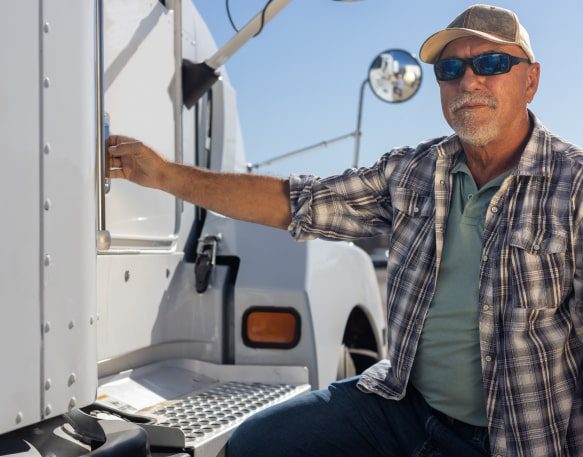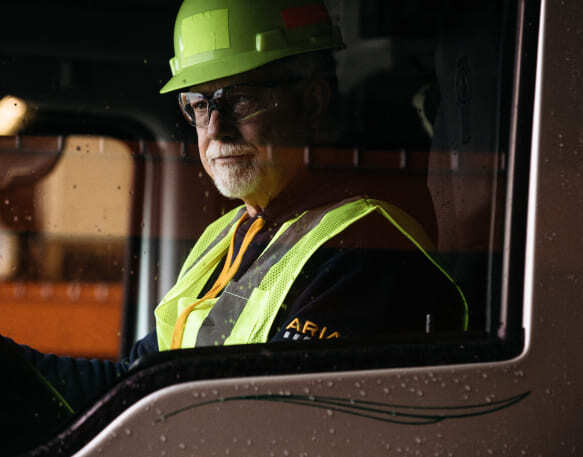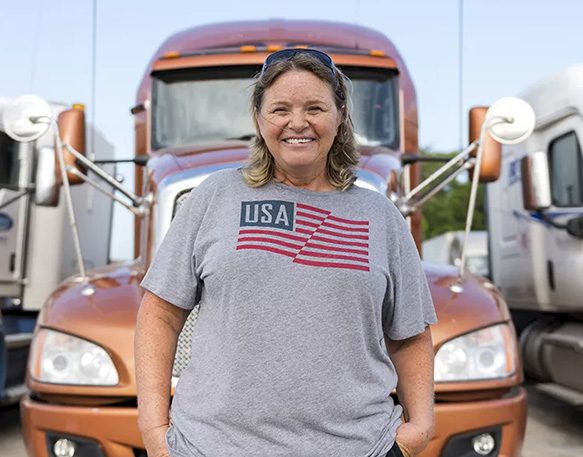If you’re interested in a career on the road, becoming an owner-operator can have major benefits. It offers the freedom to manage your own load matches and independence in your trucking career. But operating your vehicle independently also comes with plenty of responsibilities — from taking care of taxes to dispatching to meeting registration deadlines and more. However, as long as you stay on top of your backend responsibilities, you can have a stable career as an owner-operator that keeps growing for years to come.
Let’s take a look at what makes an owner-operator — and what you should expect if you’re considering becoming one. There are plenty of costs and benefits associated with any new career, and it’s important to understand what steps you’ll need to take for success before you get started.
What is an owner-operator?
The term “owner-operator” doesn’t just refer to truckers — there are all kinds of owner-operators across many different industries. The common thread is that all types of owner-operators work on both the back end and the front end of a business. That means that, as an owner-operator, you’ll be running the business itself, as well as focusing on the actual daily performance of your business’s services.
In terms of trucking, an owner-operator is someone who does just that: owns and operates. The daily operations of trucking — transporting goods across the country to carry on the supply chain — are still the central part of your career. But being an owner-operator can either mean running your trucking business independently, or it can mean becoming contracted or “leased on” to a larger carrier business. Both have their advantages and disadvantages, so it’s all about finding which path is right for you.
Independent vs. leased-on owner-operators
Running your own business as an independent owner-operator means you’ll need to lease or own your own vehicle, as well as balance your budget, keep track of registration requirements and taxes, and make sure you’re always insured. There are lots of components to a successful trucking operation, and owner-operators need to stay on top of all of them.
As with any small business, you’ll need to keep track of lots of backend responsibilities to keep your business running smoothly. But when you own your own business, you also have more control over your schedule and your income. You can find and dispatch your own loads for the best matches and you can build a sustainable business of your own. In other words, you are your own boss.
On the other hand, being a leased-on owner-operator means that you own your own truck but are contracted with a larger carrier, hauling loads under that carrier’s authority. Most of the time, leased-on owner-operators don’t have their own authority and wouldn’t be eligible to use the load board for interstate shipments (but could maybe use it for intrastate).
While independent owner-operators source their own loads, leased-on drivers have an arrangement with carriers to deliver the loads assigned to them and share revenue with the carrier company. This means that your profit margins might be lower as a leased-on driver, but the benefits of being leased-on provide a stronger safety net than going independent.
So owner-operators can either take the high-risk, high-reward path of going independent, or opt for consistency and security by becoming leased-on.
How to become an owner-operator
When you’re first starting a trucking company, owner-operator requirements can get a little hectic. Once you’ve made sense of all the registration, insurance, and financial requirements, though, you’ll be well on your way to creating a strong foundation for your business.
First things first, you’ll need a commercial driver’s license (CDL). If you’ve never driven a commercial vehicle before, you’ll need to develop the skills necessary to drive a truck for interstate transportation. CDL certification is the most basic form of commercial driving registration, and you can get training at a CDL school or with a registered CDL training program via a larger trucking company.
After you’ve gotten your license, you’ll need to get registered. We’ll discuss registration a little later in the article. For now, all you need to know is that every owner-operator needs to get authority from federal and state government agencies before they can start their business.
You may also need insurance to become an owner-operator. Leased-on owner-operators are typically able to operate under the insurance of the carrier they’re contracted with, but independent owner-operators will need to get their own. There are several types of trucking insurance, each with a unique goal. The most common type of insurance is primary liability insurance, which offers anywhere from $700,000 to over a million dollars of coverage. In addition to liability insurance, you will also invest in separate insurance for your cargo. Cargo insurance can be paid at a yearly rate or at a per-load rate.
For quality trucking insurance you can trust, check out DAT’s insurance partners, like Loadsure, which lets you access per-load insurance that’s flexible based on how much your loads are worth. With per-load cargo insurance, you can avoid getting overcharged by paying a yearly rate for cargo insurance. Plus, Loadsure lets you get up to $2 million in liability insurance.
How much do owner-operators make?
So, how much exactly can an owner-operator expect to make? The answer is: it varies. Of course, that probably isn’t the answer you wanted to hear. But, like any small business, the amount you make is based on the strength of your business model, your personal drive, and the strength of the tools you use. When you’re finding great freight matches, and you’re not taking losses due to underinsurance or expired licenses, it’s easier to stay on top of your budget than it would be otherwise.
Another reason that an owner-operator trucking salary is variable is because you’ll need to invest a lot upfront. Once you decide to become an owner-operator, you’re likely going to be making a multi-year commitment if you want to see a real profit and growth. That’s because owner-operators generally don’t make as much in their first year as they do later on in their careers. On top of that, it’s important to remember that you’ll have some additional costs you wouldn’t encounter if working for another business, like needing to buy your own health insurance plan if you elect to get health insurance.
In the end, the gross salary for owner-operators usually hovers around $200,000 — but this isn’t actually the size of the check you’ll take home. An effective owner-operator business will usually pocket a net salary of around $50,000 a year after all their costs are taken into account. This figure can range anywhere from a few thousand dollars lower to tens of thousands higher. It all depends on the type of freight you can find, the type of budget you’re maintaining, and the operating costs of your business.
With the registration fees, insurance payments, and the cost of leasing or even buying a truck, your first year might not yield the financial rewards you were expecting. But remember, you’re making an investment for the future. Later on, owner-operators can find trucking to be a profitable and rewarding career path.
What permits are needed for an owner-operator?
Once you’ve gotten your CDL, it’s time to get registered. There are plenty of registration requirements for freight carriers, and you’ll need to stay on top of annual renewal guidelines in order to avoid non-compliance fines. In addition to state-specific requirements, all commercial carriers must have these basic federal requirements:
- DOT number
- DOT authority
- MC number from the FMCSA.
One important point to remember is that leased-on owner-operators don’t need their own authority if they’re working for another carrier. That said, if you’re planning to operate independently, complying with these requirements is a top priority.
While getting these numbers and authorizations isn’t particularly expensive, it takes time and a lot of paperwork. You need to plan ahead to ensure you’re meeting all the necessary requirements before you get on the road.
You’ll also need to comply with tax agreements. These include:
- Heavy Vehicle Use Tax (HVUT)
- International Registration Plan (IRP)
- International Fuel Tax Agreement (IFTA)
Although IRP and IFTA are organized federally, they’re technically state-level requirements. This means that no matter what state you’re in, you’ll need to pay IRP fees to your state-level transportation commission, not the national DOT.
To stay legally protected, owner-operators need to file for BOC-3 process agents in each state where they carry freight. This may sound like a daunting task, but it can be pretty simple if you use a service that provides a blanket contract with BOC-3 agents in every state. To stay safe and legally protected on the road, you’ll also need to pass regular drug testing and FMCSA clearinghouse tests.
To stay legally protected, owner-operators need to file for BOC-3 process agents in each state where they carry freight. This may sound like a daunting task, but it can be pretty simple if you use a service that provides a blanket contract with BOC-3 agents in every state. To stay safe and legally protected on the road, you’ll also need to pass regular drug testing and FMCSA clearinghouse tests.
How Do owner-operators Find Loads?
A major part of your success as an owner-operator depends on the quality of your loads. If you’re leased-on, the carrier you work with will take care of finding the loads for you. However, independent owner-operators are responsible for finding the best loads on their own.
The best load matches are from reliable shippers in a convenient lane who have good payment rates. Identifying and connecting with those loads means engaging in one of the key elements of being an owner-operator: dispatching. There are plenty of professional dispatchers who work either independently or for larger dispatching companies and can do the heavy lifting for you. However, while hiring a dispatcher is always an option, it can be both expensive and unpredictable when you’re just starting out. That’s why many owner-operators choose to self-dispatch instead.
All you need to self-dispatch is access to a quality load board. DAT is that load board. In fact, professional dispatchers across the country use our load boards to find top-quality freight for their clients — and for good reason. The DAT load board is the largest in the industry with hundreds of thousands of new loads posted every business day. It doesn’t matter if you’re an owner-operator or a huge multinational corporation, the DAT load board shows the same quality freight to everyone who uses it.
Even better, the DAT load board is designed for people on the go. You can find new loads with ease using a filtered search engine. Connect with brokers and shippers in just a few clicks and make sure you never miss a match with personalizable alarms. Plus, you can access your DAT load board from anywhere with an internet connection when you have the DAT One mobile app.
Let DAT Help You Become an owner-operator!
There’s no doubt that it takes some work to get started as an owner-operator — and even more to really succeed as one. If you’re just starting out, all that work and all those requirements can seem frustrating at best and overwhelming at worst. Getting registration and insurance can seem like a complicated setup, but at DAT we’re here to help make the process as simple as possible.
For help getting your authority, check out the DAT Copilot™ Authority Program. Our expert team offers professional support — from filing your federal requirements to guiding you through state-level filings (filed separately) and securing your blanket BOC-3 process agents efficiently and effectively.
Once you have your authority, DAT is here to help again; this time by finding the top-quality loads that will help you get your business off the ground. Our industry-leading load board is the best way to make partnerships that will help your business thrive. With more than 266 million load postings every year, the DAT load board has far more loads than any other load board — and more than 97 million loads are posted on DAT before they’re anywhere else.
If you’re serious about becoming an owner-operator, you need the best tools in the business. DAT is here to deliver them. No matter what stage in the process you’re in, DAT has everything you need to succeed. Contact us today to learn how DAT can help you become your own boss as an owner-operator!
Become an owner-operator — the easy way!
Becoming an owner-operator means paperwork — and lots of it. It’s easy to get overwhelmed, but the DAT Copilot™ Authority Program is here to help!
Our team will take care of the paperwork, handling everything from federal requirements to process agents so you can focus on hitting the road. Sign up today to get started!




